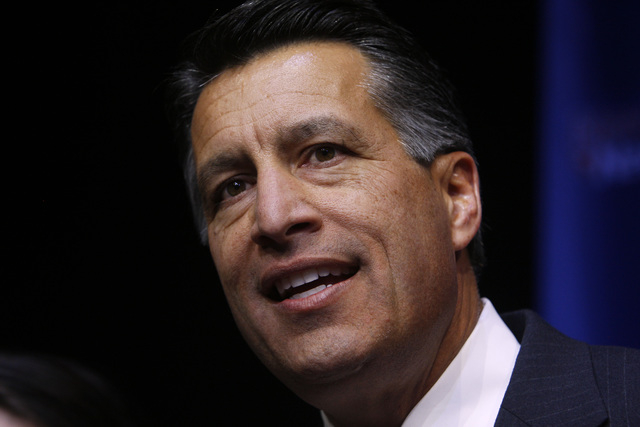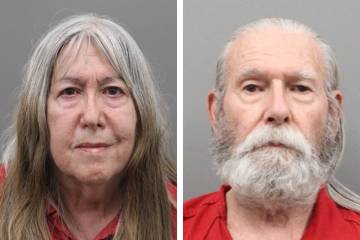State wasting no time in starting new appellate court
It took 42 years and five trips to the ballot box before Nevada voters agreed to establish an intermediate appellate court. Now state officials are on a fast track to get the court up and running to begin hearing cases as early as January.
Voters on Nov. 4 approved Question 1, a constitutional amendment authorizing an Appeals Court, by a margin of 54 percent to 46 percent. It was the fifth time such a measure had appeared on the ballot, with similar questions failing in 1972, 1980, 1992 and 2010.
The three-member intermediate appellate court is seen as crucial to clearing a backlog of cases that has grown over the years to untenable levels.
“The Supreme Court has been overwhelmed for the last few years,” said Robert Eisenberg of the Reno law firm Lemons, Grundy &Eisenberg. “It’s built up as Nevada’s population grew and there were more lawsuits, more cases and more District Court judges added.
“It was almost impossible for the Supreme Court to catch up,” Eisenberg said. “(It) just had too much work to do and there weren’t enough hours in the day.”
Statistics show Nevada’s seven-member Supreme Court receives more than 350 new appeals per justice each year, the highest caseload in the country. It was carrying a backlog of about 2,200 cases.
Money to finance the Appeals Court was authorized by the 2013 Legislature in anticipation of voter support. The state Board of Examiners, headed by Gov. Brian Sandoval, on Wednesday approved $782,500 to fund the court for the rest of the current fiscal year that ends June 30.
The request goes to the Legislature’s Interim Finance Committee for final action.
Sandoval, a former federal judge, plans to appoint the three judges in early December. They will serve a two-year appointment before the seats are up for election in 2016. The positions pay an annual salary of $165,000.
Sandoval said the new appellate court should provide a level of certainty for the business community that legal disputes will be resolved as quickly as possible.
“That’s something that businesses take into consideration, the ability to get finality with regard to a legal determination in a prompt manner,” he said. “And in Nevada, that has in some cases taken several years.”
More than 30 people have applied for the three positions. The Judicial Selection Commission will conduct public interviews in early December, with names of finalists to be forwarded to Sandoval by Dec. 5.
“The governor has indicated his intention to interview those candidates who are nominated during the week of Dec. 8,” said Justice James Hardesty, who traveled the state urging support for the ballot question.
In the meantime, the Supreme Court is drafting rules on how cases will be distributed to the new appellate court and will hold a public hearing on the proposal Dec. 4.
All appeals will still be filed with the Supreme Court, which would then “deflect” certain cases to the appellate court.
“The rule will contain a listing of case categories that would presumptively transfer cases to the Court of Appeals,” Hardesty said.
Those cases likely would include criminal appeals, nonbusiness cases with a judgment value below a certain threshold; administrative agency appeals, child custody and visitation disputes; and challenges to lower court procedures, Hardesty said.
“We recognize that the court can only reasonably handle about 800 cases per year, so many of the cases … may remain with the Supreme Court just because you don’t want to create for the appellate court the problem the Supreme Court was trying to resolve,” he said.
The Supreme Court will keep all death penalty and business court cases, large judgments appeals, and all cases involving tax and water issues. Conflicts between local governments, different branches of governments, election law and constitutional interpretations also will remain with the high court.
“There is certainly an awful lot of work to be retained by the Supreme Court,” Hardesty said.
Appellate court rulings can be appealed to the Supreme Court, but justices will have discretion on whether to consider the case or allow the lower court ruling to stand.
“The expectation is that most of these cases will be resolved at the Court of Appeals level,” Hardesty said.
WHY IT MATTERS
The goal is to speed up the appeals process, which can take two years or longer, and free up the Supreme Court to author precedent-setting opinions establishing law for lawyers and lower courts to rely on when cases involving similar issues are litigated.
“Sometimes the Supreme Court will resolve a big issue in a case but not have the time to write an opinion,” said Daniel Polsenberg, an appellate attorney with the firm of Lewis Rocha Rothgerber. “Then the issue will come up again and again.
“Taking a simple order that resolves a case and making it into a legally binding opinion takes a lot of time. Sometimes the Nevada Supreme Court just doesn’t have the time to do that. (It’s) got 2,200 cases a year,” he said.
“It’s like an ‘I Love Lucy’ episode,” Polsenberg said of the high court’s caseload. “The conveyor belt keeps moving and you have to resolve all the cases as they go through. Under the old system, something has to give.”
The Appeals Court will also ensure that cases that don’t rise to the level of constitutional importance will receive the review and attention the parties involved deserve, he said.
“Maybe a child custody case isn’t important to anybody else, but it’s terribly important to those parents and those children,” Polsenberg said.
Nevada became the 41st state to implement an appellate court, 20 years after the last state, Mississippi, did so in 1995, according to the National Center for State Courts.
If the experience in Mississippi is any indication, Nevada’s new court will greatly improve court operations and case resolution.
“It was implemented to address the backlog, and it’s done that,” said Beverly Kraft, spokeswoman for the administrative office of courts in Jackson, Miss.
Mississippi Supreme Court Justice Leslie D. King agreed.
“It was averaging about five years to get a case through the system, from notice of appeal to issuance of a decision,” said King, who served on the Court of Appeals following its creation until he was appointed to the Supreme Court in 2011 and subsequently elected.
Nevada’s appellate court is similar to Mississippi’s in that both use a deflective process where all appeals are filed with the state Supreme Court, which assigns some to the appellate court while retaining others. Like Nevada, appeals of appellate court rulings are at the discretion of the Supreme Court.
King echoed the sentiments of Nevada lawyers and judges, saying reducing the time for appeals to be decided has been particularly helpful in child custody disputes.
“Those are extremely difficult situations,” King said. “In a child custody action … that distance between parents can become greater and greater as time gets by. But if you can get a quick resolution to those issues, it allows the family to try to heal.”
But Mississippi has another law that has also greatly cut down the time frame for appeals. Under state law, the Court of Appeals and the Supreme Court are required to render a decision within 270 days from when the final brief in a case is filed.
“The courts in recent years have always met that deadline and frequently decide cases in a shorter period of time,” Kraft said. “It has led to timely decisions so people can get their matters resolved. That was the intent of the legislation.”
The strict time constraint has reduced delay tactics by lawyers, King said.
“For a long period of time, particularly in civil damages cases, we saw more and more appeals,” he said. “But I think now that the disposition of those cases has been expedited, you don’t see those appeals that are done merely to string out the case.”
Court of Appeals Chief Judge L. Joseph Lee said the Mississippi appellate court handles about 2½ times the volume of cases as does the Supreme Court.
The Appeals Court has 10 judges, while the Supreme Court has nine justices. Lee wondered how Nevada will do with only three judges on the appellate court.
“You’re going to operate the Court of Appeals with only three judges”? Lee said. “They’re going to be worked. They’re definitely going to be worked.”
Hardesty said although Nevada’s constitutional amendment allows for expansion of the Appeals Court, there is no immediate plan to do so.
“We are not. We’ve never planned to do that. We have no intention of doing that next year,” Hardesty said.
He said a bill draft request submitted by the Supreme Court for the legislative session that begins in February was intended as a place holder in case clean-up language was needed to implement the new court.
“That (bill draft request) was never intended to be used and will not be used to request the Legislature to add more judges,” Hardesty said.






















